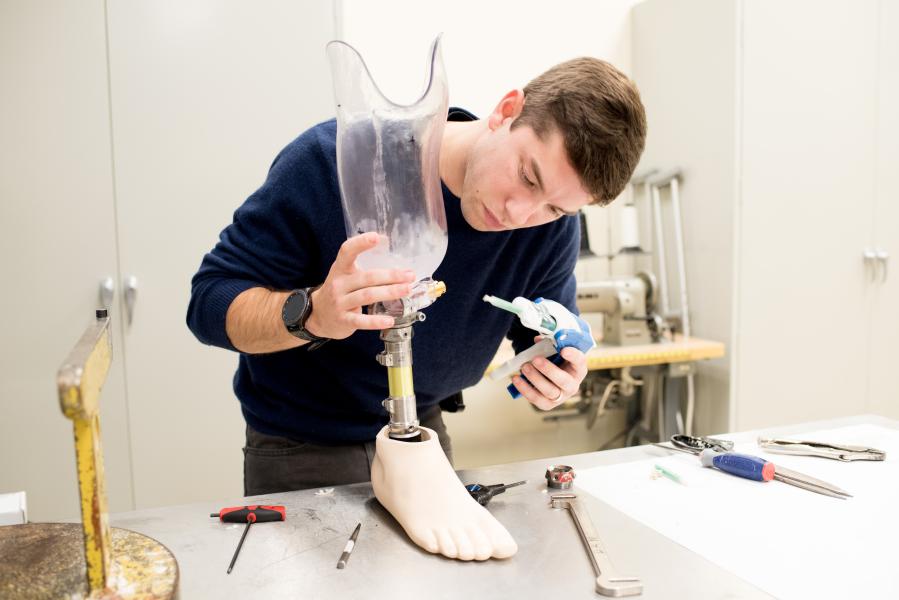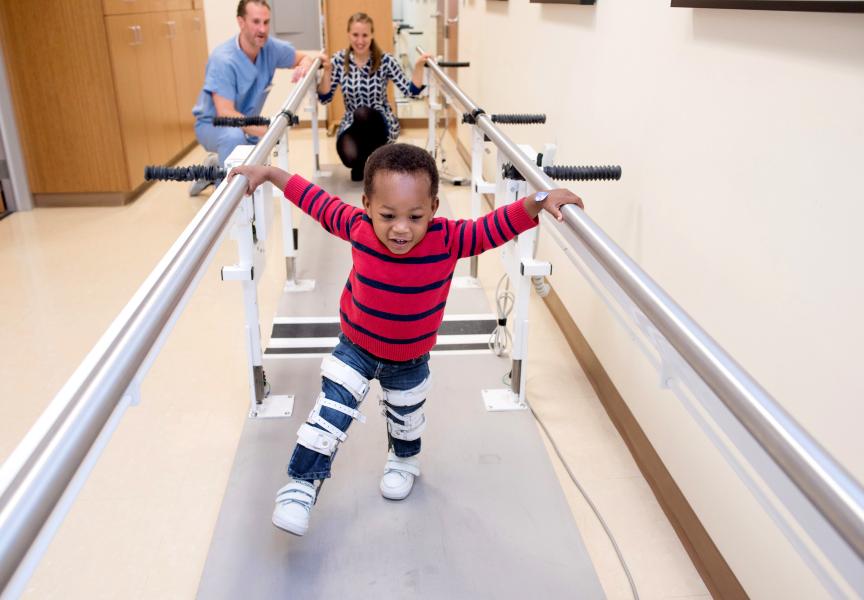UCSF Orthotics and Prosthetics Research
Mission
The mission of the UCSF Orthotic and Prosthetic research division is to improve patient care through developing evidence-based programs and protocols. Our research utilizes an interdisciplinary approach gathering patient reported and functional outcome measures to determine the impact of orthotic and prosthetic devices on patients’ quality of life and goals.
Vision
We aim to be leaders in orthotic and prosthetic research, producing translatable evidence that will transform the profession and improve the quality of patient care in our clinics and across the globe.
Our Work
The UCSF Orthotic and Prosthetic research division seeks to develop stronger evidence for clinical decision making in the treatment of orthotic and prosthetic patients around the globe. We focus on research which can be directly implemented into practice and incorporates assessment of how patients use their devices in daily life beyond the clinic. Our research involves specialists from the following UCSF departments/centers; Departments of Orthopaedic Surgery (Spine, Peds, Sports Medicine, Human Performance Center, PM&R), Department of Pediatric Surgery, iCORES and METRICs. Internationally our research is in partnership with UCSF IGOT, Muhimbili Orthopaedic Institute and Kilimanjaro Christian Medical Centre. Clinical research ranges from retrospective studies to multi-center prospective trials to elevate patient care.
Current Projects
The Orthotic and Prosthetic Center (OPC) currently has a total of approximately 15 research protocols approved by the UCSF Institutional Review Board (IRB), including pediatric and adult orthotic and prosthetic device users. Our research is funded in part through; the American Orthotic and Prosthetic Association – Center for Orthotic and Prosthetic Learning and Outcomes/Evidence-Based Practice (AOPA COPL), Department of Defense, UCSF NOVA and LegWorks.
Our prosthetic projects, aim to revolutionize the way we understand amputee care locally and globally. One international project, led by David Shearer, MD, MPH and the team at IGOT, is demonstrating the cost effectiveness of providing prosthetic devices for transfemoral amputees in Tanzania. One local project, Physical Rehabilitation Optimization and Patient Education for Life, (PROPEL) is developing a multidisciplinary patient assessment to improve community mobility and quality of life for patients with unilateral transtibial and transfemoral amputation.
The international Center for Osseointegration Research, Education and Surgery (iCORES) program focuses on the basic, clinical, and translational research involving bone-anchored implants. Historically involved in the utilization of the Compress® device for fixation of endoprostheses used in the reconstruction of massive skeletal defects in cancer patients, we are now investigating osseointegration technology to help in the rehabilitation of patients with amputation. Advanced studies include efforts to develop brain-machine interface systems that enable bidirectional intuitive volitional control of, and sensory/proprioceptive feedback from, external prostheses.
The ASSIST: Amputee Safe Smart Implant Sensor Technology, aims to better understand the biomechanics of activities of daily living in patients with amputation. Using orthopaedic oncology limb salvage patients as a control group, where necessary, we hypothesize that we will be able to characterize patient-specific kinematic metrics using a variety of noninvasive wearable sensors. The study population will potentially include amputees at any upper and/or lower extremity level. We aim to establish normative movement patterns in these populations so as to guide rehabilitation in a safe fashion and to proactively monitor and avoid potential complications so as to improve overall outcomes.
An NIH ancillary metric to the Transtibial Amputation Outcomes Study (TAOS). The purpose of the ProFit study was to validate a questionnaire developed by clinicians and prosthetists to assess the quality of prosthesis rendering (overall fit and alignment).
Our orthotic projects center around assessing how well specific devices achieve their intended purpose. Our study on pectus carinatum orthoses uses temperature and pressure sensors to determine the ideal treatment criteria for this condition. The research led by Erik N. Hansen, MD, aims at understanding the impact of osteoarthritis knee orthoses on patients’ activity and pain outside of the clinical environment. For infants who require cranial remolding orthoses, we are analyzing criteria to create a predictive model for guiding care.
Quantifying Biofeedback Training and Retention Effects on Functional Outcomes in Above-Knee Prosthesis Users: Led by Matthew Leineweber at San Jose State University this proof-of-concept clinical trial is aimed at developing best-practices for incorporating biofeedback (BFB) training into gait retraining protocols for individuals with above knee amputations to improve functional outcomes and decrease the prevalence of secondary injury. Sponsor: Department of Defense office of the Congressionally Directed Medical Research Programs (CDMRP).
IRB Approved Research Protocols
1. 15-15804 Impact of prostheses on quality of life and functional status of transfemoral amputees in Tanzania
2. 15-16233 Can Improved Prosthetic Alignment Increase Activity Level in Patients with Lower Extremity Amputations – Data Analysis Only
3. 15-16764 OPRA - TFAOS
- Study is closed to accrual.
4. 15-17899** Empirical Measurement of Dosing Efficacy in Pectus Carinatum Bracing: A Prospective Cohort Study
- A Prospective Cohort Study - Pectus carinatum is a chest wall deformity most commonly seen in teenage boys. Prior to skeletal maturity, correction of this prominence can be achieved with the use of a pectus carinatum orthosis (PCO). This study is collecting wear time data, in-brace pressure data and patient reported outcome measures to optimize the orthotic treatment. Sponsor: American Orthotic and Prosthetic Association.
- UCSF Pectus Carinatum
- Study is closed to accrual.
- Study is closed to accrual.
7. 18-26295 Proximal Junctional Kyphosis Rates after the Introduction of the UCSF Soft TLSO: A Retrospective Study
- This is a retrospective study (chart review) looking at the incidence of proximal junctional kyphosis (PJK) in UCSF patients who have received a soft TLSO (backpack brace) post-operatively. The UCSF soft TLSO was designed to restrict trunk motion with the intention of decreasing the likelihood of PJK, and we are interested in how effective it is. Sponsor: UCSF NOVA Grant
- This is a study of normal walking mechanics barefoot and with sneakers. Objective will be to collect normalized data for both groups and see if there is a significant difference between range of motion and torque values of the hip, knee, and ankle joints over level ground walking.
- RedCap Survey
9. 19-29051** The Effect of Osteoarthritis Bracing on Community Involvement, A Pilot Study
- This study will measure the effects of unloader knee orthoses on activity and pain levels of participants with unilateral knee osteoarthritis. An Actigraph activity monitor in addition to various outcome measures will be used to investigate the out of-clinic benefits of the unloader knee orthoses. Sponsor: American Orthotic and Prosthetic Association
10. 19-28003 ASSIST: Amputee Safe Smart Implant Sensor Technology
- This study aims to better understand the biomechanics of activities of daily living in patients with amputation. Using orthopaedic oncology limb salvage patients as a control group, where necessary, we hypothesize that we will be able to characterize patient-specific kinematic metrics using a variety of noninvasive wearable sensors. The study population will potentially include amputees at any upper and/or lower extremity level. We aim to establish normative movement patterns in these populations so as to guide rehabilitation in a safe fashion and to proactively monitor and avoid potential complications so as to improve overall outcomes.
11. 19-29073 Cranial Helmet Treatment Equation
- For babies diagnosed with plagiocephaly or brachycephaly the standard treatment is a cranial remolding orthosis (CRO). This retrospective chart review is investigating the impact of treatment parameters like age and cranial deformity on CRO efficacy.
12. 20-30155 Physical Rehabilitation Optimization and Patient Education for Life (PROPEL)
- This study is assessing the impact of a new comprehensive wellness program for persons with lower limb loss using a multidisciplinary team approach. The personalized 12-week wellness program incorporates strength training, nutrition education, and pain management. The changes in physical function are measured through assessing muscle strength, balance, and endurance pre- and post-program. The improvements in quality of life and pain are being measured through patient-reported outcomes administered before, throughout, and at the end of the 12-week program.
- A bone anchored percutaneous titanium fixture for the rehabilitation of patients with transfemoral amputation (OPRA) was granted FDA approval under a Pre-Market Approval (PMA) pathway December 18, 2020. The OPRATM Implant System has received Institutional Review Board (IRB) approval for related studies at the University of California, San Francisco (UCSF), and subject recruitment is ongoing. Patients with above knee amputations due to trauma or cancer and who have or are anticipated to have rehabilitation problems with, or cannot use, a conventional socket prosthesis are potential candidates. Implantation of this device will require two separate surgeries with a monitored rehabilitation program to follow. Patients who are interested in use of the device will be given all the risks and potential benefits of the device and then asked if they would like to participate in the clinical research component of the study.
15. NO IRB Cost Analysis of Prosthetic Devices: A Systemic Review
16. 283215 Tanzania: BK Cost Effective Analysis -Pending IRB/Funding
17. Advancing New Methodologies to Measure Patient Preference for Regulatory Approval of Devices -Data Collection
18. 00005989 ProFit Study
- An NIH ancillary metric to the Transtibial Amputation Outcomes Study (TAOS). The purpose of the ProFit study was to validate a questionnaire developed by clinicians and prosthetists to assess the quality of prosthesis rendering (overall fit and alignment).
**Resident Research Studies
Completed Projects/Historic Projects
1. 17-22086 Patient Reported Efficacy of the UCSF Custom Pectus Carinatum Orthosis
2. 10-02970 Phase III Multi-Center Magnetic Alteration of Pectus Excavatum (IDE#G090006)
Recent Publications
Recent Presentations
1. "Implementation of a research protocol to investigate quality of life, functional outcomes, and cost effectiveness of above knee prostheses in Tanzania" - Presented by Alexander Hetherington, CPO at the International Society for Orthotics and Prosthetics World Congress in 2019
2. "Patient Reported Efficacy of the UCSF Pectus Carinatum Orthosis" (Resident Research) - Presented by Maria Lesieutre, MSPO, CPO at American Orthotic and Prosthetic Association National Assembly Meeting 2019
3. "Treatment Parameters for the UCSF Pectus Carinatum Orthosis: A Pilot Study" (Resident Research) - Presented by Chrysta Irolla, MS, MSPO, CPO and Emily Nelson, MS, MSOP, CPO at the American Orthotic and Prosthetic Association National Assembly Meeting in 2021 and awarded the Thränhardt Lecture
4. "Proximal Junctional Kyphosis Rates after the Introduction of a Modified Soft TLSO: A Retrospective Study" Presented by Jennifer O'Donnell, MD at the UCSF CME: 66th Annual LeRoy C. Abbott Society Scientific Program and 53rd Annual Verne T. Inman Lectureship in 2022
Participation
Our department is also developing a biomechanical database of able bodied subjects to use as comparison for future research studies. Reach out if you are interested in participating by filling out this RedCap Survey.
Contact Us
Please reach out to OandPresearch@ucsf.edu with inquiries or if you are interested in collaborating on future studies.

